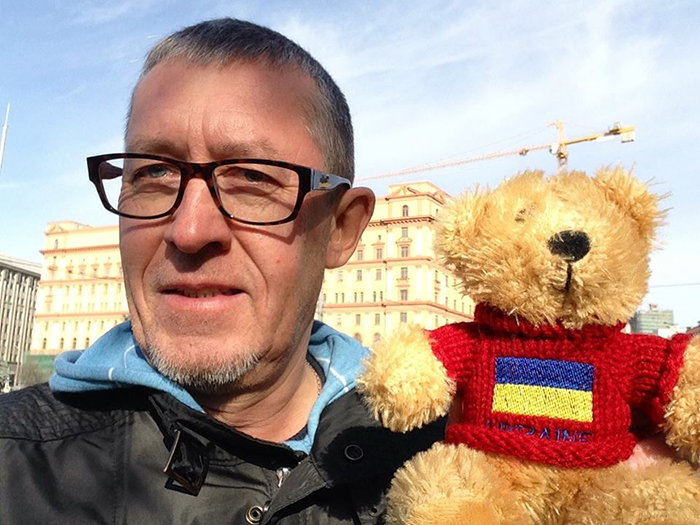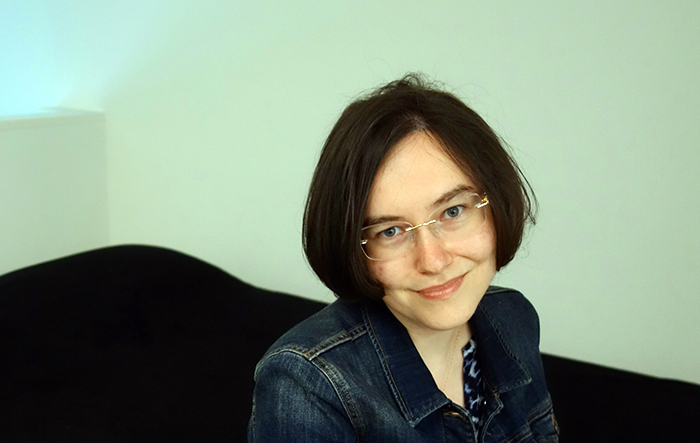[vc_row][vc_column][vc_single_image image=”97735″ img_size=”full” add_caption=”yes” alignment=”center”][vc_column_text]This article is part of Index on Censorship partner Global Journalist’s Project Exile series, which has published interviews with exiled journalists from around the world.[/vc_column_text][vc_column_text]Kseniya Kirillova thought her stay in the U.S. would be only temporary.
When she left her hometown of Ekaterinburg, Russia in the spring of 2014 to move to Seattle with her husband, a Ukrainian software engineer, she had little experience in international affairs.
But all that changed as Russia began to openly back separatists in eastern Ukraine, and eventually invaded and annexed the Crimean Peninsula. Kirillova, who had previously worked for Novaya Gazeta, an independent Russian newspaper known for its investigations of corruption and criticism of the Kremlin, was taken aback. She had many friends in Ukraine, and was determined to do all she could to counter what she saw as Russian propaganda that was feeding the war effort.
She began writing about Russian propaganda for the website Novy Region. Often critical of President Vladimir Putin, the site had been founded by a friend, Russian journalist Alexander Shchetinin. Shchetinin had founded the news outlet in the 1990s but was forced to leave the company under pressure from the Russian government in 2014. He later relaunched the site in Ukraine.
Kirillova wasn’t unfamiliar with the difficulties reporters face in challenging the Russian government. At least 58 journalists have been killed in Russia since 1993, according to the Committee to Protect Journalists. That includes several Novaya Gazeta journalists who were killed or died in mysterious circumstances since 2000.
Living in the U.S., was safe. But in August 2016, Shchetinin, who had called Putin his “personal enemy,” was found dead of a gunshot wound to the head in his apartment in Kiev. A suicide note was found near Shchetinin’s body. Kirillova doesn’t believe Shchetinin killed himself, and Ukrainian authorities opened a murder investigation.
Soon after Shchetinin’s death, Kirillova found a pro-Russia site online listing the names of “anti-Russia extremists.” Her name was on the list. A return to Russia, already dangerous, now seemed potentially deadly.
Today Kirillova, 33, lives in Oakland, Calif. and is a contributor to the Russian service of U.S.-backed Radio Free Europe/Radio Liberty as well as the Ukrainian broadcaster TCH. She spoke with Global Journalist’s Jiwon Choi about the death of her collaborator and her efforts to counter propaganda in Russian media.
Global Journalist: How has the conflict between Russia and Ukraine affected you?
Kirillova: All my problems in Russia started because of my activity in America. Before I came here, I worked for several years…for Novaya Gazeta in the Urals branch. I lived in my hometown Ekaterinburg. I came to America accidentally. My husband, who is a citizen of Ukraine, he had a temporary work contract in the U.S. At the same time, the Russian and Ukrainian war began [in] March 2014.
It was a real shock for me. I considered it my duty to do something, so I began to analyze Russian propaganda, [their] fears and their mentality. The main importance for me was if this information could prevent new Russian provocations around the world.
GJ: How has journalism in Russia changed in recent years?
Kirillova: When I was in Russia, I sometimes covered some dangerous topics. Before the war, Russian [media] was defending Putin’s regime, but not as aggressively as it is now. It wasn’t so hard to talk about the government. We [reporters could write about] corruption and tell the truth about political, social and other spheres. Local government authorities were independent from the federal.
In 2010, the government changed in my region. They created a united power system and added a position like a city monitor, who was appointed by the federal government. It became impossible to cover any social problems, because any problems have something to do with government officials. It became impossible to publish any critical articles.
GJ: When did you first hear that the Russian government was targeting you and Alexander?
Kirillova: My close friend Alexander Shchetinin warned me that both of us would be charged with state treason. It was in in the spring of 2015. Russian authorities were accusing even ordinary people who didn’t have any access to state secrets, including simple housewives and saleswomen. The Russian Supreme Court recognized [Nova Region] as an extremist site only because it was in Ukraine and was opposed to Russian aggression. Thus, we officially became journalists of an “extremist” resource.
The Russian authorities instituted criminal proceedings against my friends, Russian dissidents from Ekaterinburg, even for innocent posts in social networks condemning the war. Thus, we already understood that a criminal case was waiting for us in Russia.

Russian journalist Alexander Shchetinin, pictured in front of the former headquarters of the KGB in Moscow with a stuffed bear.
GJ: How did you feel when you learned that Alexander was dead?
Kirillova: Alexander was someone who made the same choice as me – supporting Ukraine as a Russian journalist. Before his death, he lost most of his business, couldn’t visit his family and his adult children in Russia. He fought against Russian propaganda and agents of Russian influence in Ukraine.
I don’t believe that it was a suicide. He died a month after the murder of another Russian opposition journalist in Kiev, Pavel Sheremet. After the strange death of Alexander in Kiev, I found an article on an official Russian propaganda website which was later removed. It said that all Russian journalists who support Ukraine might be killed. My name was on the list.
GJ: What is the most difficult part of living in exile in the United States?
Kirillova: For a long time, I didn’t even have a work permit in the U.S. I was waiting for asylum [for] two years, even before the murder of Alexander. I was working for two years as a volunteer, without any payment. Now everything is fine, I have a work permit.
I lost everything because of my decision–I don’t mean the decision to come here, but the decision to start this work. But I never had illusions about this topic. [/vc_column_text][/vc_column][/vc_row][vc_row][vc_column width=”1/2″][vc_video link=”https://youtu.be/tOxGaGKy6fo”][/vc_column][vc_column width=”1/2″][vc_column_text]Index on Censorship partner Global Journalist is a website that features global press freedom and international news stories as well as a weekly radio program that airs on KBIA, mid-Missouri’s NPR affiliate, and partner stations in six other states. The website and radio show are produced jointly by professional staff and student journalists at the University of Missouri’s School of Journalism, the oldest school of journalism in the United States. [/vc_column_text][/vc_column][/vc_row][vc_row][vc_column][vc_custom_heading text=”Don’t lose your voice. Stay informed.” use_theme_fonts=”yes”][vc_separator color=”black”][vc_row_inner][vc_column_inner width=”1/2″][vc_column_text]Index on Censorship is a nonprofit that campaigns for and defends free expression worldwide. We publish work by censored writers and artists, promote debate, and monitor threats to free speech. We believe that everyone should be free to express themselves without fear of harm or persecution – no matter what their views.
Join our mailing list (or follow us on Twitter or Facebook) and we’ll send you our weekly newsletter about our activities defending free speech. We won’t share your personal information with anyone outside Index.[/vc_column_text][/vc_column_inner][vc_column_inner width=”1/2″][gravityform id=”20″ title=”false” description=”false” ajax=”false”][/vc_column_inner][/vc_row_inner][vc_separator color=”black”][/vc_column][/vc_row][vc_row][vc_column][vc_basic_grid post_type=”post” max_items=”6″ style=”load-more” items_per_page=”2″ element_width=”12″ grid_id=”vc_gid:1516813685289-3cea7194-74a5-4″ taxonomies=”22142″][/vc_column][/vc_row]





